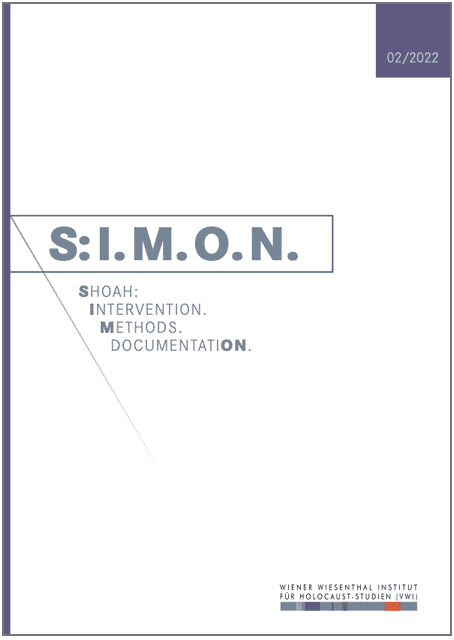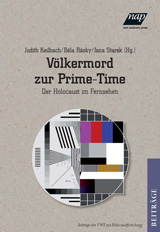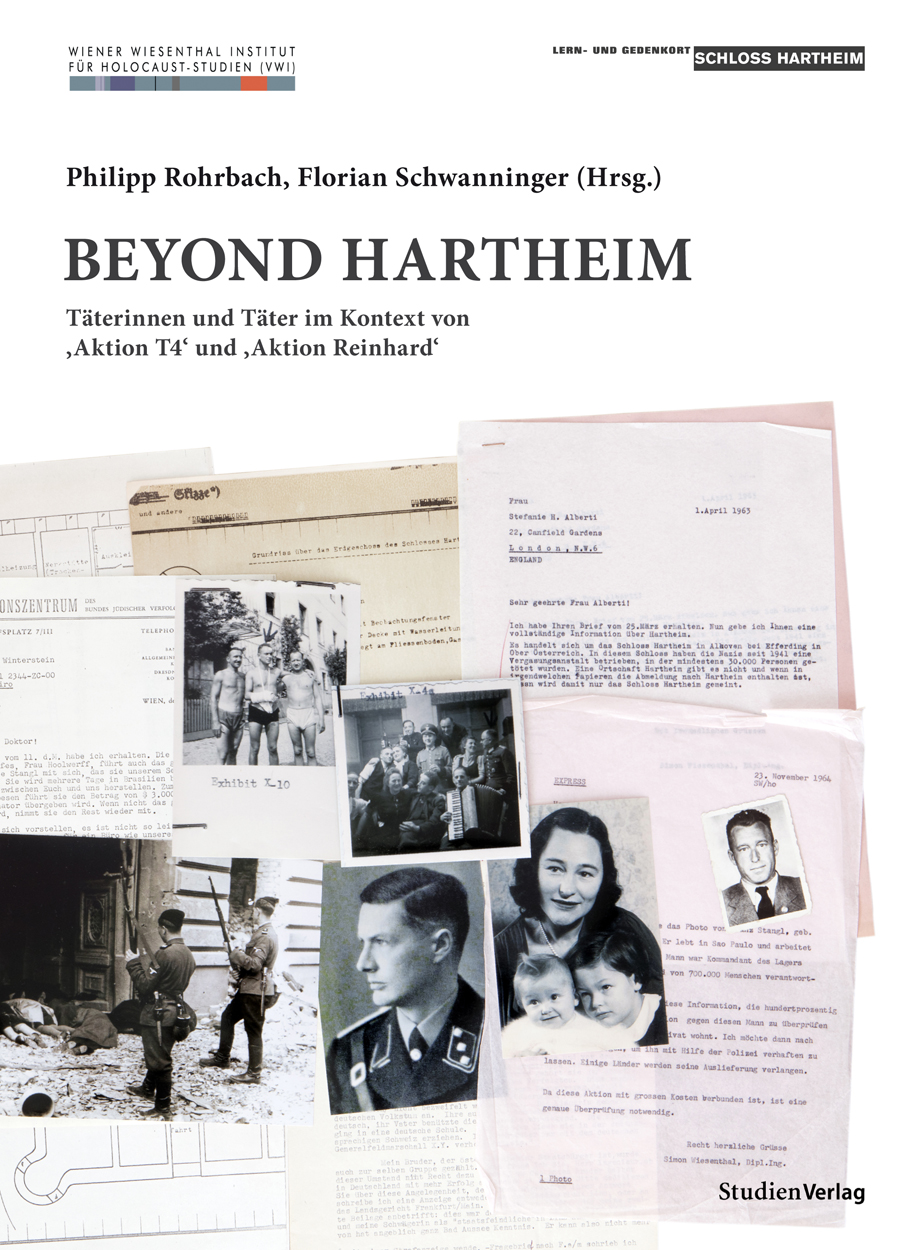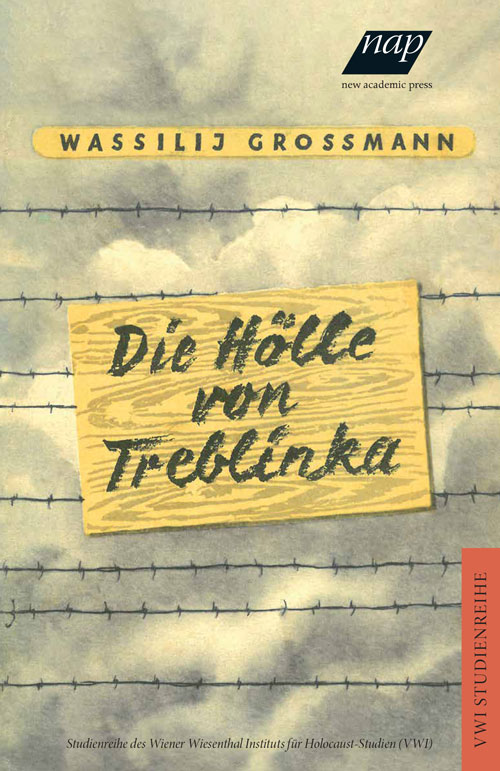News – Events – Calls
| 24. April 2024 19:00 BuchpräsentationIngeborg Bachmann, Marie Luise Kaschnitz, Hilde Domin, Nelly Sachs: Über Grenzen sprechend. Briefe. Piper/Suhrkamp, München, Berlin, Zürich 2023Ingeborg Bachmann stand mit zentralen Protagonistinnen der deutschsprachigen Literatur im Austausch, nun werden ihre Briefwechsel mit Marie Luise Kaschnitz, Hilde Domin und Nelly Sachs erstmals zugänglich gemacht. Die Briefe geben Einblick in die Lebensbedingungen, das literarische S...Weiterlesen... |
| 02. May 2024 18:30 Simon Wiesenthal LectureEdyta Gawron: Never Too Late to Remember, Never Too Late for Justice! Holocaust Research and Commemoration in Contemporary PolandIn 1994, Simon Wiesenthal received a doctorate honoris causa from the Jagiellonian University in Krakow for his lifelong quest for justice – half a century after he had been, for a short time, prisoner of the local Nazi Concentration Camp (KL) Plaszow. The 1990s were the decade when t...Weiterlesen... |
| 07. May 2024 00:00 - 04. June 2024 00:00 WorkshopDealing with Antisemitism in the Past and Present. Scientific Organisations and the State of Research in AustriaThis series of talks, presented by antisemitism experts from different organisations that research antisemitism using a variety of academic approaches, aims to provide a snapshot of historical evolutions, current events, prevalent perceptions and declared (and undeclared) attitudes. I...Weiterlesen... |
| 14. May 2024 08:45 - 16. May 2024 16:30 TagungQuantifying the Holocaust. Classifying, Counting, Modeling: What Contribution to Holocaust History? About the conference: https://quantiholocaust.sciencesconf.org/ Programme timed on the basis of 15-minute presentations + 15-minute discussions; short breaks and lunches Day 1 Tuesday, 14 May 2024Centre Malher (9 rue Malher 75004 Paris/amphi Dupuis) From 8.45 am: Welcome9.30 am...Weiterlesen... |
| 24. May 2024 18:00 InterventionLange Nacht der Forschung 20242024 öffnet das Wiener Wiesenthal Institut für Holocaust-Studien (VWI) in der Langen Nacht der Forschung wieder seine Tore und lädt Interessierte in seine Räumlichkeiten am Rabensteig 3 ein. Im Rahmen von Vorträgen, Podiumsdiskussionen und Präsentationen bieten VWI-Team und Gäste Einb...Weiterlesen... |
Maria Bogdan
Fortunoff Research Fellow (10/2023 – 09/2025)
The Representation of the Forgotten-Silenced: Understanding the Social Process of Cultural Trauma of the European Romani Communities
 As a VWI Fortunoff Fellow, Maria Bogdan researches testimonies in the Fortunoff Video Archive for Holocaust Testimonies related to the Sinti and Roma experience. As part of this work, she - together with the archive's partner, the Milana Šimečku Foundation (MSF) in Bratislava - promotes the use of Slovak-language testimonies of Sinti and Roma survivors. More than a dozen of the testimonies are currently closed to the public due to issues related to privacy and legal regulations. She is working with the MSF to open up the collection and enable its use in teaching and research. At the same time, she is working on her current research project on social processes of cultural traumatisation in European Roma communities.
As a VWI Fortunoff Fellow, Maria Bogdan researches testimonies in the Fortunoff Video Archive for Holocaust Testimonies related to the Sinti and Roma experience. As part of this work, she - together with the archive's partner, the Milana Šimečku Foundation (MSF) in Bratislava - promotes the use of Slovak-language testimonies of Sinti and Roma survivors. More than a dozen of the testimonies are currently closed to the public due to issues related to privacy and legal regulations. She is working with the MSF to open up the collection and enable its use in teaching and research. At the same time, she is working on her current research project on social processes of cultural traumatisation in European Roma communities.
Maria Bogdan, media researcher and social scientist. PhD in Film, media and cultural theory at the Eötvös Loránd University in Budapest. Graduate and first Romani Rose Postdoctoral Researcher fellow at the Antigypsyism Research Center at Heidelberg University. Founding member and managing editor of the Critical Romani Studies journal.
E-Mail: This email address is being protected from spambots. You need JavaScript enabled to view it.
Fortunoff Research Fellowship 2021/22 at the Vienna Wiesenthal Institute for Holocaust Studies (VWI)
The Vienna Wiesenthal Institute for Holocaust Studies (VWI) and the Fortunoff Archive at Yale University invite applications for its research fellowship for the period of October 2021 to May 2022.
The VWI is an academic institution dedicated to the study and documentation of antisemitism, racism, nationalism, and the Holocaust. Conceived and established during Simon Wiesenthal’s lifetime, the VWI receives funding from the Austrian Ministry of Science, Research and Economy as well as the City of Vienna. Research at the institute focuses on the Holocaust in its European context, including its antecedents and its aftermath.Furthermore we encourage researchers from the field of Digital Humanities working on holocaust-relevant topics to submit their application.
The Fortunoff Video Archive is a collection within the Manuscripts and Archives Department of Sterling Memorial Library at Yale University. The Archive, which began as a grassroots effort in New Haven to record on video the testimonies of survivors, witnesses, and bystanders in 1979, currently holds more than 4,400 testimonies comprising over 10,000 hours of moving image materials. These testimonies were produced with the cooperation of 37 affiliate projects working in over a dozen countries and just as many languages. The archive is still recording testimony today at Yale University. The Fortunoff Archive is a unique collection that has served as an important resource for scholarship in a wide range of disciplines for more than three decades.
Scholars who have preferably but not necessarily completed their PhD studies and have produced works of scholarship are eligible for receiving a research fellowship. The VWI-Fortunoff Research Fellow will be able to conduct research on a topic of their choice in the field of Holocaust studies at the VWI using the digital collection of the Fortunoff Archive in Vienna. Beyond the research work itself, the stay at the institute is intended to encourage communication and scientific exchange among the fellows at the institute. The VWI-Fortunoff Research Fellow is expected to support the institute’s academic work and provide research adjective and support to junior fellows. The VWI-Fortunoff Research Fellow must be regularly present at the VWI.
Research projects are to focus on a topic relevant to the research interests on oral history of the Holocaust with special focus on the collections of the Fortunoff Archive. Within this parameter, applicants are free to choose their own topic, approach and methodology. The Fortunoff Research Fellow will also have access to the archives of the VWI. It is expected that the fellow will make use of relevant resources from the collection in their research projects. Research results will be the subject of formal fellow’s discussion and will be presented to the wider public at regular intervals. At the end of their stay, the fellow is required to submit a research paper which will be peer-reviewed and published in the institute’s e-journal S:I.M.O.N. – Shoah: Intervention. Methods. Documentation. He/She will also pick a testimony used for his/her research paper from the Fortunoff-collection, annotate the transcript to explain terms, places and provide context with the goal of making the testimony understandable to a broader readership. This annotated critical edition will include a short introductory essay. These critical editions will be made available on the Fortunoff collection’s website as interactive documents, as well as in S:I.M.O.N.
The VWI-Fortunoff Research fellowship is awarded for a duration of six months. He or she will have a workstation with computer and Internet access and will receive a monthly stipend of € 2,200. In addition, VWI will cover housing costs during the fellowship (up to € 700) as well as the costs of a round-trip to and from Vienna (coach class airfare or 2nd class train fare). There is an additional one-off payment of € 500 available for research conducted outside of Vienna or photocopying costs outside of the institute, where applicable.
The VWI-Fortunoff Research fellow will be selected by the International Academic Advisory Board of the VWI and of the Fortunoff Archive.
Applications may be submitted in English and must include the following documents:
- completed application form,
- a detailed description of the research project, including the research objectives, an overview of existing research on the topic and methodology (12,000 characters max.)
- a list of publications and a CV with a photo, if not already included in application form (optional).
Please send your application in electronic format (in one integral *.pdf-file) with the subject header “VWI-Fortunoff Research Fellowship 2021/22” by 27 January 2021 to:
This email address is being protected from spambots. You need JavaScript enabled to view it..
If you do not get confirmation that we have received your proposal, please contact us.
Fortunoff Research Fellowship 2022/23 at the Vienna Wiesenthal Institute for Holocaust Studies (VWI)
The Vienna Wiesenthal Institute for Holocaust Studies (VWI) and the Fortunoff Archive at Yale University invite applications for its research fellowship for the period of October 2022 to August 2023 (11 months).
The VWI is an academic institution dedicated to the study and documentation of antisemitism, racism, nationalism, and the Holocaust. Conceived and established during Simon Wiesenthal’s lifetime, the VWI receives funding from the Austrian Ministry of Science, Research and Economy as well as the City of Vienna. Research at the Institute focuses on the Holocaust in its European context, including its antecedents and its aftermath.
The Fortunoff Video Archive is a collection within the Manuscripts and Archives Department of Sterling Memorial Library at Yale University. The Archive, which began as a grassroots effort in New Haven to record on video the testimonies of survivors, witnesses, and bystanders in 1979, currently holds more than 4,400 testimonies comprising over 10,000 hours of moving image materials. These testimonies were produced with the cooperation of 37 affiliate projects working in over a dozen countries and just as many languages. The archive is still recording testimony today at Yale University. The Fortunoff Archive is a unique collection that has served as an important resource for scholarship in a wide range of disciplines for more than three decades.
Scholars who have completed their PhD studies and have produced works of scholarship are eligible for receiving a research fellowship. The Fortunoff Research Fellow will be able to conduct research on a topic of their choice in the field of Holocaust studies at the VWI using the digital collection of the Fortunoff Archive in Vienna. Beyond the research work itself, the stay at the Institute is intended to encourage communication and scientific exchange among the fellows at the Institute. The Fortunoff Research Fellow is expected to support the Institute’s academic work and provide research adjective and support to junior fellows. The Fortunoff Research Fellow must be regularly present at the VWI.
Research projects are to focus on a topic relevant to the research interests on oral history of the Holocaust with special focus on the collections of the Fortunoff Archive. Within this parameter, applicants are free to choose their own topic, approach and methodology. The Fortunoff Research Fellow will also have access to the archives of the VWI. It is expected that the fellow will make use of relevant resources from the collection in their research projects. Research results will be the subject of formal fellow’s discussion and will be presented to the wider public at regular intervals. At the end of his/her stay, the fellow is required to submit a research paper which will be peer-reviewed and published in the Institute’s e-journal S:I.M.O.N. – Shoah: Intervention. Methods. Documentation. He/She will also pick a testimony used for his/her research paper from the Fortunoff Archive’s collection, annotate the transcript to explain terms, places and provide context with the goal of making the testimony understandable to a broader readership. This annotated critical edition will include a short introductory essay. These critical editions will be made available on the Fortunoff Archive’s collection’s website as interactive documents, as well as in S:I.M.O.N.
The Fortunoff Research fellowship is awarded for a duration of six months. He or she will have a working space and Internet access and will receive a monthly stipend of € 2,200. In addition, VWI will cover housing costs during the fellowship (up to € 700) as well as the costs of a round-trip to and from Vienna (coach class airfare or 2nd class train fare). There is an additional one-off payment of € 500 available for research conducted outside of Vienna or photocopying costs outside of the Institute, where applicable.
The Fortunoff Research fellow will be selected by the International Academic Advisory Board of the VWI and of the Fortunoff Archive.
Applications may be submitted in English and must include the following documents:
- completed application form,
- a detailed description of the research project, including the research objectives, an overview of existing research on the topic and methodology (12,000 characters max.)
- a list of publications and a CV with a photo, if not already included in application form (optional).
Please send your application in electronic format (in one integral *.pdf-file) with the subject header “Fortunoff Research Fellowship 2022/23” by 14 January 2022 to:
This email address is being protected from spambots. You need JavaScript enabled to view it..
If you do not get confirmation that we have received your proposal, please contact us.
Nikolaus Hagen
Fortunoff-VWI Research Fellow (10/2019-08/2020)
The Nazi Persecution of ‘Mixed Marriages’. A Comparative Study on Gendered Experiences of Persecution
 Roughly 20,000 marriages in the ‘Third Reich’ were considered ‘mixed marriages’ as a consequence of the Nuremberg Laws, due to one of the spouses being declared ‘Jewish’. Although those deemed Jewish within such marriages were generally subject to the same persecution as other Jews, there was a precarious degree of ‘protection’, taking into consideration the non-Jewish spouses and families. However, the legal norms and the practical measures which these couples were subject to were manifold and complicated in nature and thus provided a degree of despotic arbitrariness, bringing about many individually and regionally differentiated experiences and consequences of persecution, including deportation and murder. These manifold experiences of persecution were gender-specific in nature – an aspect that has often been neglected. This project addresses such gendered experiences of persecution through a regional comparative study.
Roughly 20,000 marriages in the ‘Third Reich’ were considered ‘mixed marriages’ as a consequence of the Nuremberg Laws, due to one of the spouses being declared ‘Jewish’. Although those deemed Jewish within such marriages were generally subject to the same persecution as other Jews, there was a precarious degree of ‘protection’, taking into consideration the non-Jewish spouses and families. However, the legal norms and the practical measures which these couples were subject to were manifold and complicated in nature and thus provided a degree of despotic arbitrariness, bringing about many individually and regionally differentiated experiences and consequences of persecution, including deportation and murder. These manifold experiences of persecution were gender-specific in nature – an aspect that has often been neglected. This project addresses such gendered experiences of persecution through a regional comparative study.
Nikolaus Hagen is a historian and lecturer in the Department of Contemporary History at the University of Innsbruck and at the University College for Teacher Education Vorarlberg. In 2019, he is also an EHRI Fellow at the Arolsen Archives. He was previously a research fellow and assistant curator at the Jewish Museum Munich.
E-Mail: This email address is being protected from spambots. You need JavaScript enabled to view it.
Fortunoff Research Fellowship 2020/21 at the Vienna Wiesenthal Institute for Holocaust Studies (VWI)
The Vienna Wiesenthal Institute for Holocaust Studies (VWI) and the Fortunoff Archive at Yale University invite applications for its research fellowship for the period of October 2020 to May 2021.
The VWI is an academic institution dedicated to the study and documentation of antisemitism, racism, nationalism, and the Holocaust. Conceived and established during Simon Wiesenthal’s lifetime, the VWI receives funding from the Austrian Ministry of Education, Science, and Research as well as the City of Vienna. Research at the institute focuses on the Holocaust in its European context, including its antecedents and its aftermath.
The Fortunoff Video Archive is a collection within the Manuscripts and Archives Department of Sterling Memorial Library at Yale University. The Archive, which began as a grassroots effort in New Haven to record on video the testimonies of survivors, witnesses, and bystanders in 1979, currently holds more than 4,400 testimonies comprising over 10,000 hours of moving image materials. These testimonies were produced with the cooperation of 37 affiliate projects working in over a dozen countries and just as many languages. The archive is still recording testimony today at Yale University. The Fortunoff Archive is a unique collection that has served as an important resource for scholarship in a wide range of disciplines for more than three decades.
Scholars who have completed their PhD studies and have produced works of scholarship are eligible for receiving a research fellowship. The Fortunoff Research Fellow will be able to conduct research on a topic of their choice in the field of Holocaust studies at the VWI using the digital collection of the Fortunoff Archive in Vienna. Beyond the research work itself, the stay at the institute is intended to encourage communication and scientific exchange among the fellows at the institute. The Fortunoff Research Fellow is expected to support the institute’s academic work and provide research adjective and support to junior fellows. The Fortunoff Research Fellow must be regularly present at the VWI.
Research projects are to focus on a topic relevant to the research interests on oral history of the Holocaust with special focus on the collections of the Fortunoff Archive. Within this parameter, applicants are free to choose their own topic, approach and methodology. The Fortunoff Research Fellow will also have access to the archives of the VWI. It is expected that the fellow will make use of relevant resources from the collection in their research projects. Research results will be the subject of formal fellow’s discussion and will be presented to the wider public at regular intervals. At the end of their stay, the fellow is required to submit a research paper which will be peer-reviewed and published in the institute’s e-journal S:I.M.O.N. – Shoah: Intervention. Methods. Documentation. He/She will also pick a testimony used for his/her research paper from the Fortunoff-collection, annotate the transcript to explain terms, places and provide context with the goal of making the testimony understandable to a broader readership. This annotated critical edition will include a short introductory essay. These critical editions will be made available on the Fortunoff collection’s website as interactive documents, as well as in S:I.M.O.N.
The Fortunoff Research fellowship is awarded for a duration of eight months. He or she will have a workstation with computer and Internet access and will receive a monthly stipend of € 2,200. In addition, VWI will cover housing costs during the fellowship (up to € 700) as well as the costs of a round-trip to and from Vienna (coach class airfare or 2nd class train fare). There is an additional one-off payment of € 500 available for research conducted outside of Vienna or photocopying costs outside of the institute, where applicable.
The Fortunoff Research fellow will be selected by the International Academic Advisory Board of the VWI and of the Fortunoff Archive.
Applications may be submitted in English and must include the following documents:
- completed application form,
- a detailed description of the research project, including the research objectives, an overview of existing research on the topic and methodology (12,000 characters max.)
- a list of publications and a CV with a photo, if not already included in application form (optional).
Please send your application in electronic format (in one integral *.pdf-file) with the subject header “Fortunoff Research Fellowship 2020/21” by 12 January 2020 to: This email address is being protected from spambots. You need JavaScript enabled to view it..
If you do not get confirmation that we have received your proposal, please contact us.










